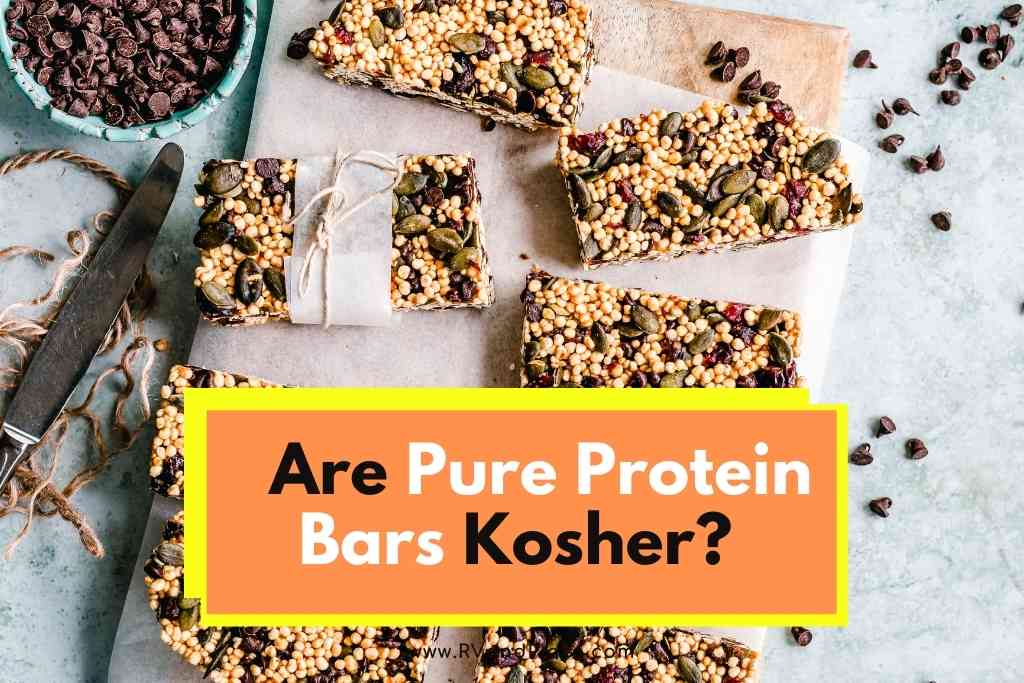Have you ever asked yourself or your friend if Pure protein bars are kosher? Look no more. We´ve got you covered.
So, are Pure Protein Bars Kosher? Pure protein bars are not certified kosher food. This means the bars are made with ingredients that are not kosher or they’re manufactured with equipment that is not kosher. Those who practice a kosher lifestyle should not include Pure Protein bars in their grocery shopping.
It’s not difficult to stick to a kosher dietary lifestyle. You just have to be vigilant in your shopping and know what is and isn’t kosher.
In this article, we’re looking at Pure Protein bars and discussing what you should know when you look at the packaging to see if the food is kosher.
Read on to find out why those eating kosher diets should not eat Pure Protein bars.
Table of Contents
What Does Kosher Mean?
If you’re reading this, you probably already know what kosher means with regards to food. Let’s just take a moment to talk briefly about what it is for those who may not understand.
Kosher is food or drinks that are allowable under the Jewish dietary laws. These laws are extensive and regulate what foods the people are allowed to eat.
Kosher foods are separated to three categories–dairy, meat, and pareve or parve.
Beyond the type of food, there are also rules about how the foods are permitted to be processed, as well as the ways they can be eaten.
For instance, under kosher law, you can not eat meat and dairy at the same time.
Read also: Are Fiber One Bars Kosher? (Snacks Bars – Nobody Is Talking About!)
Are Pure Protein Bars Kosher?
Pure Protein bars are not kosher. There are various oils present in the bars that are not considered kosher. Many of the ingredients in the Pure Protein bars have been processed.
For many foods, the processing makes the food non-kosher.
The ingredients may have been kosher before processing, in some cases, but the processing makes them no longer kosher. Then the end product is non-kosher, regardless of what other ingredients are in it.
How Do I Know a Food is Kosher?
Kosher dietary law is complex. The meat category is the easiest to understand. Kosher meat comes from animals with split hooves. An example of an animal with a split hoof is a cow. Beef processed appropriately is kosher.
However, horse meat is not kosher because a horse’s hoof is not split.
Kosher dairy products are made with the milk from any kosher animal. Dairy must be processed on equipment that is used only for kosher foods. The equipment must also be kosher itself.
The last category, pareve, is the catchall for everything else. This is where Pure Protein bars would fall if they were kosher. This is the category that includes packaged foods, fish, produce, pasta, and eggs.
Labeling Kosher Foods
Many foods included in the pareve category are pre-packaged. It’s hard to know by looking at an ingredients list if something is kosher or not.
One quick trick would be to look for ingredients that are processed. If you see these, the food is not kosher.
There is a labeling system for certified kosher foods, though. Let’s look at how it works.
It starts with four letters–K, D, U, and P. Each letter is used for a different situation.
- K – K is the obvious certification letter. It indicates that a packaged food is kosher. You’ll generally see the K where the package is sealed. If there’s a circle around the K, that’s a specific kosher certification given by the OK Kosher Certification company.
- D – D is not a stand alone certification. You’ll see D after K on some kosher foods. It means there is dairy in the food or that it was processed on equipment that also processes dairy. It’s there to let those eating kosher diets that they must follow the kosher dietary laws surrounding dairy.
- U – U is what pre-packaged foods are usually labeled with. U means food in the pareve category is certified kosher. Sometimes there is a circle around the U.
- P – P indicates kosher food that is also allowable during the Jewish Passover holiday. There are additional kosher dietary laws governing food intake for Passover.
What’s in Pure Protein Bars?
There is a protein blend made of milk protein isolate, whey protein isolate, and whey protein concentrate in these bars.
You’ll also find soy protein that’s been processed to make crispy bits for texture.
Other ingredients include sugar, carnauba wax, palm oil, and canola oil. Most of the ingredients have been through some kind of processing prior to being added into the Pure Protein bars.
Each bar has 200 calories and 5 grams of fat. There are 160 milligrams of sodium, 10 milligrams of cholesterol, 18 grams of carbohydrates, 3 grams of sugar, and 20 grams of protein.
Read also: Are Pure Protein Bars Vegan? (Best Tips!)
Are There Kosher Protein Bars?
You can find kosher protein bars if you’re looking for them. They’ll have the U, usually inside a circle, printed somewhere on the packaging.
They’re typically more expensive because of the kosher ingredients, so plan for that when you’re looking to purchase kosher protein bars.
Wrap Up
Pure Protein bars make good snacks for a lot of people. If you’re following a kosher dietary plan, though, these bars are not for you.
Pure Protein bars are not certified kosher because they have several ingredients that don’t fall within the dietary laws.
Look for protein bars that have a U printed on the packaging to know that they are certified kosher foods.
Here are some of my favorite services, products, and Stores
There are affiliate links, so if you do decide to use any of them, I´ll earn a small commission. But in all honesty, these are the exact what I use and recommend to everyone, even my own family.
To see all my of most up-to-date recommendations, check out this resource that I made for you!
+ Products & Services
+ Convenience Stores
+ Save Thousands of Dollars
References
https://shop.pureprotein.com/Bars/c/PureProtein@Bars
https://www.webmd.com/food-recipes/kosher-food
Recent Posts
Are Fiber One Bars Kosher? (Snacks Bars – Nobody Is Talking About!)
Have you ever asked yourself or your friend are Fiber One Bars Kosher? Look no more. We´ve got you covered. So, are Fiber One Bars Kosher? No, all Fiber One Bars are not Kosher. They used to all...
Bagels are a great item to have in your pantry when you want a quick and easy breakfast. They can be enjoyed simply toasted with butter, or you can make a sandwich on them that will keep you feeling...


